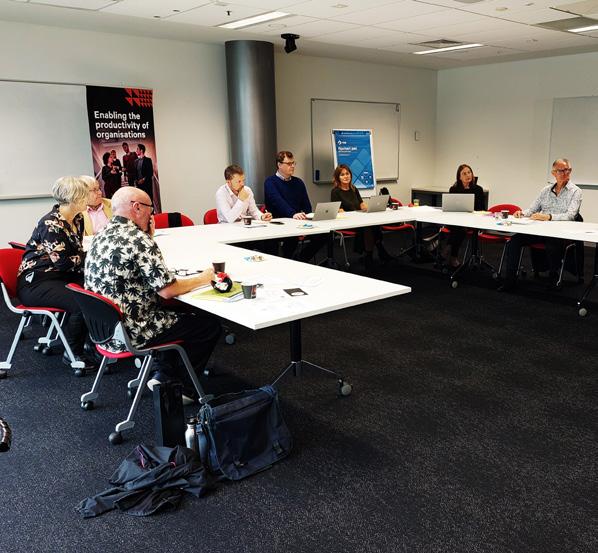
5 minute read
HRNZ’s latest research symposium
The HRNZ Academic Branch Committee met on 4 December 2023 for a fullday research symposium, hosted by the University of Auckland Business School. Professor Fiona Edgar, Head of Department, Department of Management, University of Otago, reports back here.
The symposium aimed to share our knowledge on the latest research in HRM, network with our NZ-based HR academics and create a platform for HR academics to develop professionally and receive feedback on their research.
During the morning session, the committee reviewed its 2023 achievements, finalised the 2024 goals and shared research interests for input and collaboration. An overview of some of that research is noted below.
In the afternoon session, we opened our symposium beyond our committee to share the following with the University of Auckland Business School staff and PhD students.
HRNZ 2023 MEMBER VOICE: SHAPING THE PROFESSION ANNUAL SURVEY
Our Academic Branch Committee member Professor Jim Arrowsmith manages this survey and discussed results on crucial HRM trends and challenges, such as recruitment and retention pressures, including in HR, technology and analytics, training and development, including that of managers. In terms of HRNZ’s domains of knowledge, results showed that progress has been made in HR administration and employee engagement, although industrial relations is becoming more problematic. Concerning HR capabilities, influence skills were reported as especially important, as well as analytical skills vital in navigating multiple and often competing demands. There were mixed perceptions of needing professional accreditation and an HR Code of Practice, although those in smaller organisations were more positive. Results demonstrated that HRNZ offerings for competency development were rated highly (see HR Trends 2023 – HRNZ Member Survey).
FUTURE HRM RESEARCH
A panel discussion on current and future directions in HRM research was then held, with Professors Fiona Edgar and Maree Roche and Dr Joanne Mutter as panellists and Dr Russell Wordsworth as the moderator. Three inescapable trends were discussed: sustainability, AI and wellbeing.
Sustainability: Advance the Green agenda to ensure that HR supports the delivery of sustainability objectives in the organisation.
Hybrid work and future of work: Conduct research that examines the impact of COVID-19 on alternative work arrangements, what should continue as good practice, why organisations are winding things back and reaction to this. Examining how the ‘future of work’ has evolved post-pandemic and that of the gig economy and precarious work.
Artificial intelligence: AI’s impact on the nature of work and the types of jobs available in the future. For example, its effect on the HR function and how we recruit, select, develop, reward and retain human capital.
The panel also discussed the challenges in the research space, particularly how we make sure our research has impact and value to a practitioner audience, and how to balance the tension between publishing quickly and having industry relevance.
CURRENT RESEARCH
At the University of Canterbury, Sarah Wright is looking at the interesting topic of loneliness in the workplace and understanding how work practices can lead to relational connection and disconnection at work. Russell Wordsworth is looking at how people experience and respond to being ‘trapped’ in jobs or organisations they would prefer to leave. Referred to as ‘reluctant staying’, some employees choose to ‘wait it out’, others sit in a holding pattern or reframe the situation.
At the University of Otago, Nataliya Podgorodnichenko is leading a research team looking into how sustainable HRM is evolving in Aotearoa New Zealand workplaces and what role HR practitioners play in driving sustainability. Paula O’Kane has a body of research exploring the paradoxical tensions experienced by human resources business partners. These tensions often arise from different expectations (administrative versus strategic) and complex relationships (balancing line manager partner and the other members of HR).
At AUT, several large projects are under way. Led by David Williamson and Candice Harris, and in association with Unite Union, the largest survey of hospitality employees ever undertaken in Aotearoa New Zealand was completed. Two thousand two hundred respondents provided detailed data on sector conditions. Katherine Ravenswood is leading research that investigates workplace violence, and the role that gender, race and class discrimination may play in violence occurring at work. AUT is also home to the New Zealand Work Research Institute (NZWRI), led by Gail Pacheco. NZWRI provides multidisciplinary, inquiry-driven research with social impact.
At the University of Auckland, Joanne Mutter is collaborating with Kaye Thorn from Massey University on research into the impact of hybrid working on dual-career couples. The increasingly blurred boundaries between work and home, which are an inherent component of hybrid working, means that new boundary management tactics are required to facilitate effective work and home life. Maree Roche’s work revolves around leadership mental health and mindsets, employee wellbeing and mental health at work, and Māori leadership and employee wellbeing, particularly from a Māori kaupapa perspective.
If you are interested in any of these studies and wish to seek further information, please contact the researcher.
HRNZ’S ACADEMIC BRANCH COMMITTEE
Candice Harris (AUT)
Craig Robertson (Unitec)
Deepika Jindal (The University of Auckland) Branch President
Fiona Edgar (University of Otago)
Jim Arrowsmith (Massey University, Auckland) Branch Secretary
Maree Roche (University of Auckland)
Mark Harcourt (University of Waikato)
Noelle Donnelly (Victoria University of Wellington)
Paul Toulson (Massey University, Manawatū)
Russell Wordsworth (University of Canterbury)










